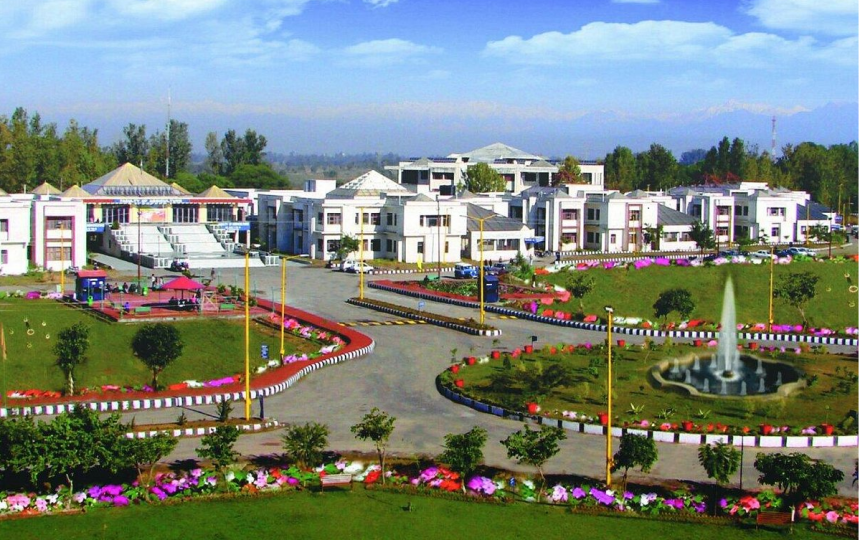As admissions open for 2025-26 session, we are excited to introduce Sher-e-Kashmir University of Agricultural Sciences and Technology of Kashmir (SKUAST-K) and provide aspiring students with an insight into how joining this prestigious institution can make a difference in their academic journey.
SKUAST-K is a premier, multi-campus, and research-intensive institution, comprising seven academic campuses, fourteen Krishi Vigyan Kendras (KVKs), and eleven research stations. Since its inception in 1982, SKUAST-K has consistently ranked among India’s top agricultural universities, excelling in teaching, research, outreach, and innovation.
Currently, SKUAST-K ranks 10th in Agriculture and Allied Sectors nationwide, and holds the top spot in Start-ups among all State Agricultural Universities (SAUs), as well as in Innovation and Start-ups among the eleven universities in Jammu and Kashmir (J&K). Over the past five years, the university has secured 52 patents and facilitated the creation of 67 start-ups, with Technology Readiness Levels ranging from 5 to 8. These accomplishments, spearheaded by both faculty and students, align with SKUAST-K’s mission of nurturing the next generation of global leaders.
The university plays a critical role in advancing food, nutritional, and economic security across the state. Among its recent notable innovations is Paddy variety Shalimar Rice-4 (SR-4), which yields up to 110 quintals per hectare, significantly, surpassing the national average of 25 quintals. University has also developed the first Kashmir Basmati Rice variety Shalimar Sughand-1 and revived traditional rice landraces such as Mushkbudji, renowned for its superior aroma and Zag (Red rice).
In the field of horticulture, university has transformed traditional farming methods by adopting high-density farming techniques, resulting in a dramatic boost in productivityfrom a modest 10 tons to an exceptionally high 60 tons per hectare. University has made significant strides in diverse fields, including veterinary and animal sciences, forestry, fisheries, agricultural engineering, food science, environmental sciences, and sericulture.
The university’s future vision includes positioning Jammu and Kashmir as a model bio-economy state in India. The Holistic Agricultural Development Project, valued at Rs 5,013 crores and approved by the Hon’ble Lieutenant Governor of J&K, was conceived and developed at SKUAST-K. This project was dedicated to the union territory by the Hon’ble Prime Minister of India.
To boost agricultural exports, the university has crafted the JK EXIM Policy, providing essential guidelines for the state and stakeholders. By embracing emerging technologies such as Artificial Intelligence, IoT, automation, precision agriculture, gene editing through CRISPR-Cas, genetically engineered vaccines, and regenerative medicine, SKUAST-K is at the forefront of global competitiveness.
Our innovative approaches to Integrated Pest and Disease Management and Integrated Nutrition Management, including the development of biocontrol agents, biofertilizers, and biopesticides, promote soil health, environmental sustainability and human well-being.
Looking forward SKUAST-K is committed to creating a globally competitive workforce. University’s unique model of Agricultural Education emphasizes outcome-based education, fostering creative, entrepreneurial and industry-ready graduates. The university model of education seeks to move beyond the traditional system of teaching and research and connect education and research, with innovation and stakeholders in a dynamic spinning wheel that bridges disconnect between the four components.
A system of education that is responsive to the aspirations of stakeholders and that creates knowledge and wealth through research and innovations. This Model is expected to create graduates who are competent in domain subjects, possess new skills including social and life skills and leadership attributes and are truly global citizens as envisaged in NEP-2020.
As a sequel to NEP-2020, Post Graduate Programmes at SKUAST-K from the Session 2025-2026 are offered in Sandwich Mode (SWM). Sandwich Mode means that a PG student is required to spend up to one semester of research/course work at an Agricultural Institution within the Country other than his/her Parent University (SKUAST-K).
The University shall facilitate/arrange placement of students in other Agricultural Institutions under Sandwich Mode (SWM).With this background SKUAST-K invites application for admission to various degree programmes for the academic year 2025-26.
Faculties in brief:
The Faculty of Agriculture
Established in 1960, it offers undergraduate and postgraduate programs in Agriculture, Forestry, Horticulture, and Sericulture. The campus spans 92 hectares, equipped with state-of-the-art facilities, including labs, a library, and IT infrastructure. With over 6,000 graduates, the faculty produces professionals working at various levels in developmental departments, academic institutions, and research organizations.
The Faculty of Veterinary Sciences and Animal Husbandry (FVSc& AH)
Established in 1984, it offers programs in veterinary sciences, dairy technology, and animal husbandry. It is equipped with modern laboratories and animal farms for research in animal health, genetics, and vaccines.
The Faculty of Forestry
Located in Ganderbal, it offers forestry education and research in silviculture, agroforestry, forest resource management, and wildlife sciences. The faculty’s 50-hectare experimental farm and its collaboration with national and international institutions enhance its research capabilities. Many alumni work in the Indian Forest Services (IFS) and other prestigious organizations.
The Faculty of Fisheries
Established in 2005, it is the first in India to specialize in coldwater/hill fisheries. It offers degree programs in fisheries sciences and is renowned for its research in trout farming and fish health. The faculty also promotes entrepreneurship in the fisheries sector through skill development.
The College of Temperate Sericulture
Founded in 1982, it offers programs in sericulture and has developed a strong industry interface. The college’s infrastructure supports research in mulberry and silkworm genetics, with opportunities for startups in sericulture-based enterprises.
The College of Agricultural Engineering and Technology
Established in 1987, provides education in agricultural engineering, AI in agriculture, and renewable energy. The college’s facilities include research labs, workshops, and a farm machinery testing center. It collaborates with industries to develop technologies that benefit farmers.
SKUAST-K is committed to producing a workforce that can drive innovation, enhance agricultural productivity, and address environmental challenges. With state-of-the-art infrastructure and industry partnerships, it remains a top choice for agri-education in the region. A detailed account of different courses offered by University and other relevant information is available in the Admission Brochure 2025.








